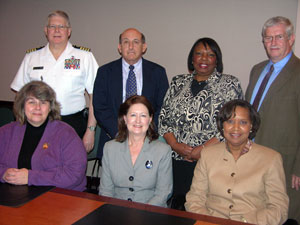 |
Back from left: HRSA reviewers Capt. Dave Ellison, Wade Hanna, M.D., Patricia Parker and Daniel Miles with Robyn Henderson, front left, executive director of the Southeast Nebraska Area Health Education Center, Roxanna Jokela, director of the Rural Health Education Network and deputy director of the Nebraska AHEC Program Office at UNMC; and Freddie Gray, interim executive director of the Omaha Urban AHEC. |
The reviews — which are conducted by HRSA’s Office of Performance Review — are one of HRSA’s strategies for improving outcomes and providing oversight data.
The reviews were not audits or compliance reviews, but rather a chance for reviewers to see how UNMC’s HRSA grant programs were progressing and to offer suggestions on how the programs could improve, said John Adams, Ph.D., assistant vice chancellor for budget and planning.
“It was an extremely positive experience,” Dr. Adams said. “The reviewers do this at many sites that have HRSA grants and that allows them to see what’s working and to pass that information along to others. Our programs will benefit from this experience.”
The reviewers were on campus for four days examining work being done on the following grants:
- Basic/Core Area Health Education Centers (AHEC);
- Partnerships to Promote Maternal Health and Child Health — UNMC CityMatCH;
- Leadership Education in Neurodevelopmental and Related Disabilities (LEND); and
- Ryan White Care Act Early Intervention Services.
During the site visit — preparations for which started in January — reviewers assessed each grant program’s progress, looked for factors that contributed to or restricted performance, including HRSA policies, and offered suggestions about improving performance.
The review allowed UNMC principal investigators and program staff time for valuable introspection while also receiving knowledgeable feedback from the reviewers, said Patrick Simpson, acting executive director of CityMatCH.
“I think it’s gone very well,” Simpson said Thursday. “The actual site visit allowed us to look inward and figure ways to improve our program without increasing our costs.”
Cindy Ellis, M.D., director of the Munroe-Meyer Institute’s Department of Developmental Medicine and the principal investigator for the LEND grant, echoed Simpson’s comments.
“The performance review was a good opportunity to look closely at some specific aspects of our program, to discuss trends in our performance with the federal officials and then receive their feedback regarding opportunities to improve,” Dr. Ellis said.
Susan Swindells, M.B.B.S., Terry K. Watanabe Chair of HIV Research and principal investigator for UNMC’s Ryan White Care Act Early Intervention Services grant, said the review gave her a chance to assess how her program measured up with others around the nation.
The feedback from reviewers indicated that the UNMC program was doing very well, Dr. Swindells said.
“It gives you a benchmark,” Dr. Swindells said. “It’s nice to have someone come from the outside and tell you objectively that you’re doing a good job.”
The site-review team complimented UNMC on its preparation for and cooperation during the visit.
Following the site visit, reviewers will develop a report suggesting no-cost/low-cost performance improvement options identified during the review, as well as evidence-based strategies for how to implement those suggestions.
The UNMC grant teams will then respond by providing the reviewers with action plans outlining how they will address suggestions made during the review.